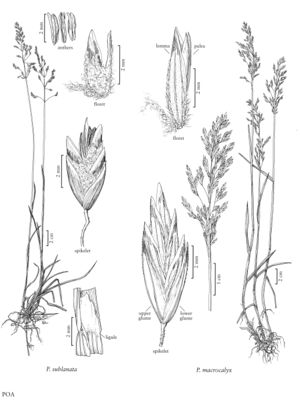Poa macrocalyx
Plants perennial; green or strongly purplish; rhizomatous, rhizomes sometimes poorly developed, densely to loosely tufted. Basal branching all or mainly extravaginal. Culms (20)30-120 cm, usually stout, erect or decumbent, not branching above the base, terete or weakly compressed; nodes terete, 1-2 exserted. Sheaths closed for 1/4 - 3/5 their length, terete to compressed, usually distinctly keeled, glabrous, sparsely to moderately scabrous, bases of basal sheaths glabrous, distal sheath lengths (0.8)1-2(2.5) times blade lengths; collars smooth, glabrous; ligules 2-5(6) mm, usually smooth, ligules of proximal leaves sometimes scabrous, obtuse, those of the distal leaves acute; blades 4-12(18) cm long, (2)3-7 mm wide, flat or loosely folded, glabrous, both surfaces smooth or the adaxial surfaces sparsely scabrous, apices broadly prow-shaped, cauline blades subequal, flag leaf blades 3-10 cm. Panicles (4)7-15(20) cm, lax, loosely contracted or open, moderately congested, with (15)20-100 spikelets and 2-4(5) branches per node; branches 3-8 cm, ascending or eventually spreading, flexuous, terete or weakly angled, usually sparsely scabridulous or scabrous, infrequently moderately densely scabrous, with (3)5-15(30) spikelets moderately crowded in the distal 1/2. Spikelets (5)6-9(12) mm, lengths to 3 times widths, laterally compressed, sometimes bulbiferous; florets 2-5, infrequently bulb-forming; rachilla internodes smooth or sparsely hispidulous. Glumes subequal in length and width, usually nearly equaling the adjacent lemmas, lanceolate to broadly lanceolate, distinctly keeled, keels sparsely to moderately scabrous distally, lateral veins prominent; lower glumes (4)4.5-7 mm, 3-veined: upper glumes (4)4.5-7(8) mm, 3(5)-veined; calluses dorsally webbed, hairs 1/3 – 2/3 times the lemma length, copious; lemmas (4)5-8 mm, lanceolate to broadly lanceolate, green or purple, distinctly keeled, keels and marginal veins long-villous, lateral veins prominent, usually softly puberulent to short-villous, intercostal regions sometimes hispidulous, infrequently softly puberulent or short-villous proximally and hispidulous in the central 1/3, sometimes merely muriculate proximally and scabrous distally, sometimes densely scabrous throughout, rarely glabrous and nearly smooth proximally and sparsely scabrous distally, margins broadly hyaline, glabrous, apices acute; palea keels scabrous, sometimes softly puberulent at midlength, intercostal regions broad, distinctly hispidulous or softly puberulent; anthers 1.5-2.5 mm. 2n = 42, 43, 44, 45, ca. 46, 49, 56, ca. 58, 63, ca. 64, ca. 65, 66, 67, 68, 69, 70, ca. 71, ca. 72, ca. 73, 74, 75, 76, 77, 78, 80, ca. 82, ca. 84, ca. 87, ca. 100.
Discussion
Poa macrocalyx grows mainly in coastal areas of boreal Alaska, and from the eastern coast of Russia to northern Japan. Bulbiferous plants are occasionally found. Poa macrocalyx resembles an exaggeratedly robust P. pratensis (p. 522), with large spikelets and lemmas, proportionally longer glumes, and paleas that are generally hispidulous between the veins and palea keels. It is cytologically and morphologically complex, and is sometimes difficult to distinguish from P. arctica subsp. lanata (see below). Poa norbergii Hulten may belong to this species; alternatively, it may be a hybrid between P. glauca (p. 576) and P. arctica (p. 576) or P. macrocalyx.
Selected References
None.
